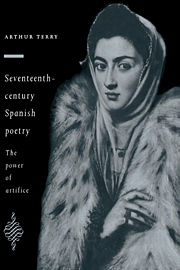Book contents
- Frontmatter
- Contents
- Preface
- List of abbreviations
- 1 The inheritance
- 2 Theory and practice
- 3 Luis de Góngora: the poetry of transformation
- 4 Lope de Vega: re-writing a life
- 5 Between two centuries: from Medrano to Valdivielso
- 6 Francisco de Quevedo: the force of eloquence
- 7 The literary epic
- 8 Plenitude and decline: from Villamediana to the second half of the century
- 9 Sor Juana Inés de la Cruz: the end of a tradition
- Epilogue
- Notes
- Select bibliography
- Index
3 - Luis de Góngora: the poetry of transformation
Published online by Cambridge University Press: 01 October 2009
- Frontmatter
- Contents
- Preface
- List of abbreviations
- 1 The inheritance
- 2 Theory and practice
- 3 Luis de Góngora: the poetry of transformation
- 4 Lope de Vega: re-writing a life
- 5 Between two centuries: from Medrano to Valdivielso
- 6 Francisco de Quevedo: the force of eloquence
- 7 The literary epic
- 8 Plenitude and decline: from Villamediana to the second half of the century
- 9 Sor Juana Inés de la Cruz: the end of a tradition
- Epilogue
- Notes
- Select bibliography
- Index
Summary
The earliest poems of Luis de Góngora (1561–1627) date from 1580, the year of Herrera's Anotaciones to Garcilaso. This might suggest a straightforward progression – Garcilaso–Herrera–Góngora – with Góngora himself as the culmination of a central tradition. The facts, however, are less simple than this: the work which Góngora was to produce in the course of the next forty years not only prolonged existing genres and created new ones, but often flowed over generic boundaries in ways that contemporary theory found it difficult to explain. Again, though Góngora is in no sense a more sophisticated poet than Garcilaso, the dense verbal elaboration which extends far beyond his major poems makes quite unprecedented demands on the intellect and the imagination of his readers.
There is one different kind of consideration which marks Góngora off from his major contemporaries: the fact that his individual poems can be dated with reasonable accuracy, thanks to the so-called Chacón manuscript, prepared with the poet's own assistance, and first published in 1921. The existence of such information is, of course, immensely valuable: to read the poems in chronological order is to become,aware of the type of intertextual relationships which classification by theme or genre tends to suppress. The obvious disadvantage, on the other hand, is that it encourages critics to treat certain poems as biographical evidence, or, alternatively, to construct a partly fictitious ‘life’ into which the poems themselves can be conveniently slotted.
- Type
- Chapter
- Information
- Seventeenth-Century Spanish Poetry , pp. 65 - 93Publisher: Cambridge University PressPrint publication year: 1993



